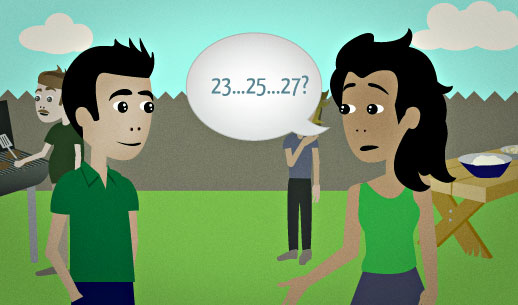“I would have guessed that you were in your mid-twenties.”
You're talking to someone who you don't know very well at a cookout. He tells you that he's 36 years old. He looks about 10 years younger than that. Surprised, you say this.
I would have guessed that you were in your mid-twenties.
Want Video and Sound? Follow us on YouTube

I would have guessed that (clause)
When you don't know something for sure, you can make a guess about it:
I would guess that you're about 25 years old.
But once you've been told something, you can't guess about it any more.
However, you can talk about what you would have guessed, if you had made a guess before you were told:
A: He's from France.
B: Really? I wouldn't have guessed that.
Wow. I would have guessed that it would be a lot more expensive than this.
I would have guessed that they would have had difficulty beating Amazon's prices.
The grammar for this is a little difficult, so let's look closely at it. The part that comes after "that" is phrased as something that is in the past and imaginary. So, if the thought is:
He is in his mid-20's.
This becomes:
I would have guessed that you were in your mid-20's.
If the thought is:
He will be late.
It becomes:
I would have guessed that you would be late.
And here's an example of a guess about the past:
She has never fired a gun.
This becomes:
I would have guessed that you had never fired a gun.
(someone) is in (their) mid-(twenties/thirties/forties/etc.)
We often don't know, or don't care about, someone's exact age. If you want to talk about someone's age in a general way, you can say it this way:
She's in her teens.
He's in his early twenties.
She's in her mid-thirties.
He's in his late forties.
These can also be written as "20's", "30's", "40's" and so on.
